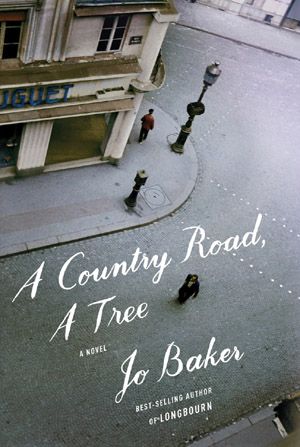Q&A with Featured Author Jo Baker

by Megan Wessell, A Bookish Affair
Jo Baker was born in Lancashire and educated at Oxford University and Queen’s University Belfast. She is the author of “Longbourn,” a national best seller and New York Times Notable Book. Her previous novels are “The Undertow,” “The Telling,” “The Mermaid’s Child” and “Offcomer.” Her most recent book is “A Country Road, A Tree.” She lives in Lancaster, England.
What inspired you to write “A Country Road, A Tree”?
The book has been hanging round me for years, nagging to be written.
It began, really, when I was studying Irish Writing at The Queen’s University of Belfast. We were looking at Beckett’s “Waiting for Godot,” and the Trilogy. The work was unlike anything I’d read before. These strange, tramp-like, persecuted characters: I couldn’t make sense of them. Then my tutor Dr. Eamonn Hughes explained that Beckett had been stuck in France during the Second World War. That he had had to go into hiding.
It was a lightbulb moment. A slow-growing eco-lightbulb. A new light on the work, but also on the man.
At first I just had an image, a gaunt, lanky figure on a dusty road, like Picasso’s sketch of Don Quixote, but on foot… but when I started to read around the subject and found out how much more Beckett had done, other than just go into hiding, the image started to move, and become a story.
Can you tell us about your favorite scene in the book?
There are some extraordinary moments in this story—of espionage, hair’s breadth escapes, immense moral courage. But it’s the ordinary moments that most linger with me. The couple lying in bed, gaunt with hunger, talking about the foods they miss.
I imagine you did a lot of research for this book. What is the most interesting or strangest thing you found during your research?
I think it would be those first acts by the early—and often doomed—resistance groups in Paris. The typing of ‘Vive La France’ on bank-notes, for example. The simplicity of it—a banknote would inevitably be passed from hand to hand, day after day, carrying this small quiet reminder of nationhood and resistance.
You’ve written many books now. Has your writing process changed at all?
I tend to write less nowadays—my early books involved a big sprawling first draft and a lot of cutting. Now I have a clearer sense, I think, of where I want to get to, and I don’t mind too much if I fill in the gaps in a collage-y kind of way… it’s less painful in terms of editing (cutting thousands of words hurts!), and in terms of wear and tear on my hands (I have got RSI—I think it’s teaching me to be economical.)
I’ve also got better at accepting the sense of blind panic that comes with every new novel. I think that feeling will always be with me, so there’s no point really giving it any attention.
And now for a fun question, if you could bring any three people with you to a deserted island, who would you bring and why?
Fun?! This is really difficult! Argh!
I’m torn between family, friends, reality and fiction, practical concerns and entertainment value… (trust a novelist to overthink it.)
I’ll have to leave out everyone I actually know, to avoid jealousies… so drawing from a source of everybody else there’s ever been, including fictional persons and those no longer with us, I’d bring:
- William (‘The Admirable’) Crichton for the desert-island know-how.
- Piggy, in the hopes that we could give him a rather nicer time.
- And Oliver Postgate, who would bring some of his animation equipment with him, and we can while away the decades making beautiful small films.


